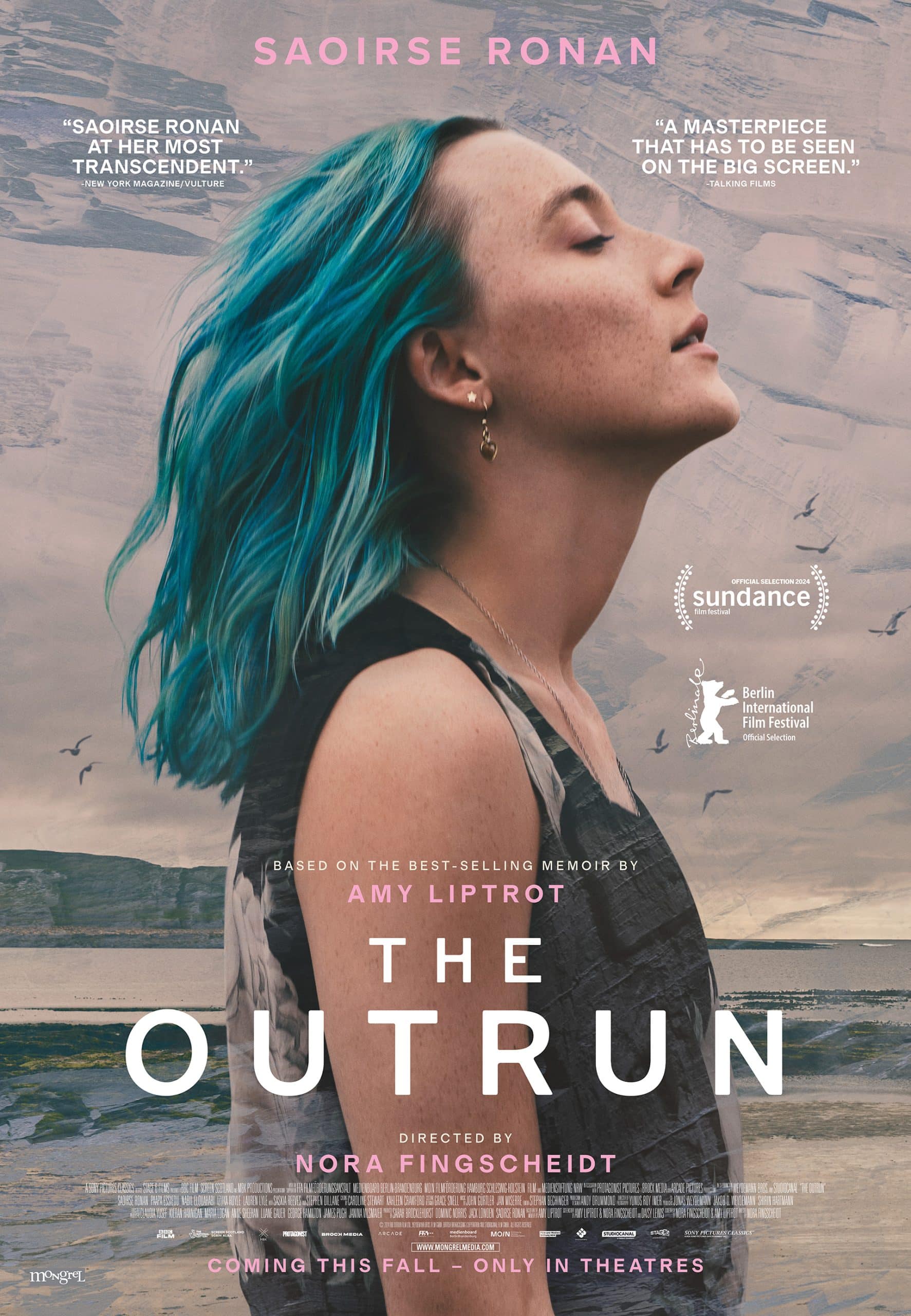
- Starring
- Saoirse Ronan, Paapa Essiedu, Saskia Reeves
- Writers
- Nora Fingscheidt, Amy Liptrot
- Director
- Nora Fingscheidt
- Rating
- 14A (Canada), R (United States)
- Running Time
- 118 minutes
- Release Date
- October 4th, 2024
Overall Score
Rating Summary
Addiction is a battle, but it’s one that, tragically, can never be fully conquered. There’s no catch-all solution to beat substance abuse, and every day is the same struggle as the day before and the day after, even as the grace of time seems to provide an advantage; to quote one minor character in The Outrun, “It never gets easy, it just gets less hard.” Perhaps that circular nature is what motivated director Nora Fingscheidt to structure her film out-of-order, accentuating that perpetual struggle by circumventing a typical linear arc toward a victory that, realistically, can never come. It’s a choice that makes thematic sense, but also one that exemplifies her continued difficulty in balancing the seriousness of her subject matter with a method of delivery that doesn’t undercut that gravity with overplayed sensory trickery.
Adapted by Fingscheidt and Amy Liptrot from the latter’s memoir of the same title, The Outrun bends the history somewhat by transplanting Liptrot’s experiences to the avatar Rona (Ronan)—is this new moniker possibly an anagram for the director’s first name? —a woman in her late 20s in a constant struggle with a severe bout of alcoholism. After a series of horrific cumulative mishaps in her personal life—delivered, as expected, in fractal form—Rona finally checks into rehab and, subsequently, attempts a new life of wilderness activism on the small coastal Orkney Islands on which she’d grown up. As fractured flashbacks of her alcohol-induced collapse pepper the runtime, Rona’s search for the elusive, endangered corncrake echoes her own search for herself… supposedly.
Well-intentioned as The Outrun clearly is in its unrelenting depiction of the spirals of alcoholism and the difficulty in staying the course that comes with beating any addiction, Fingscheidt’s habit of expressing her chosen obstacles in the most overbearing and borderline-histrionic fashion possible—as evidenced by System Crasher, essentially Germany’s far less engaging answer to Mommy—leads to a film that buries itself in its own unbearable loudness. The argument could then be made that, like the film’s fragmentary editing, the overall sensory impact of the film (featuring infrequent uses of shallow focus and blaring sound design from the club to the cliffs of Orkney) isn’t supposed to be bearable; Fingscheidt’s goal is precisely to put audiences into a discomforting headspace that mirror’s Rona’s own self-inflicted spiral. The issue, then, is that the film’s chosen avenue makes its point, only to circle back and drown itself in an atmosphere that mistakes self-importance for effective urgency.
On a base level, the issue really come down, first and foremost, to Stephan Bechinger’s editing, a ceaseless exercise in misplaced style and sluggish pacing that loses the emotional core of The Outrun in an effort to communicate that aforementioned circularity. Were Rona not a character who periodically dyed her hair, there would be no indication whatsoever of where we are at any point in the story, and Fingscheidt thus finds it nearly impossible to track any progression that would feel crushed by an eventual relapse. Yes, this is an eternal fight, but if time is going to be wasted on voiceovers covering vague platitudes about seals and seaweed mixed with scientific breakdowns of how the body absorbs alcohol, it becomes difficult to view the film as anything more than impressed with its own ability to get nowhere.
If The Outrun saves itself from crashing head-on into the white cliffs, it’s entirely by the grace of Ronan’s performance, working double-time to find any speck of subtlety in the script of a screenwriting novice and a professional melodramatist. As usual, she never allows the tragedy of her character to overcome the depth that they would need to power through it, and the constant frustration and defeatist attitude are painfully realized in the young actor’s voice and body language—really, the only time the contrast between timelines serves the film well. It’s a truly respectable performance highlighting the eternal battle against liquor, but then again, so was Andrea Riseborough’s work in To Leslie; in either case, capable as the performances were in whatever nuances they could dig from the material, that material just can’t help but scream one question above all others: “Where’s my Oscar?”
still courtesy of Sony Pictures Classics/Mongrel Media
If you liked this, please read our other reviews here and don’t forget to follow us on Twitter or Instagram or like us on Facebook.
Discover more from
Subscribe to get the latest posts sent to your email.
